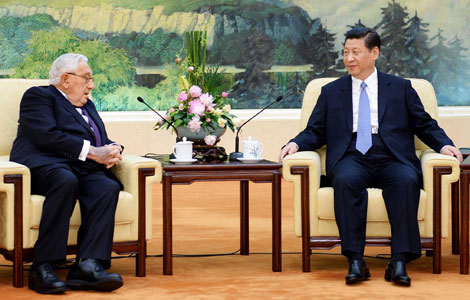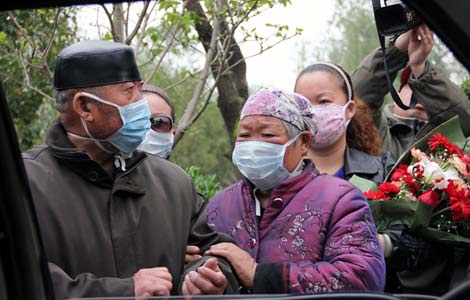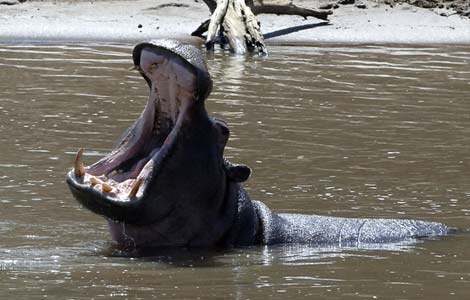US alerted to bombing suspect's travel to Russia
Updated: 2013-04-25 09:53
(Agencies)
|
||||||||
WASHINGTON - An FBI-led Joint Terrorism Task Force in Boston was alerted when one of the two brothers who later allegedly carried out the Boston Marathon bombings traveled to Russia, US officials said on Wednesday in one of several disclosures that cast new light on the government's handling of the case.
The officials also said Russia, which had tipped off the FBI about its concerns over one of the men, Tamerlan Tsarnaev, in early 2011 and asked the agency to look into him, made a second, identical request to the CIA in late September 2011.
As a result, a US intelligence official said, the CIA "nominated" Tsarnaev's name for inclusion on a government watchlist known as TIDE.
Reuters first reported on Tuesday that Tamerlan Tsarnaev's name was on that list, which is maintained by the National Counterterrorism Center and is separate - and much larger - than the US government's "no fly" list.
It remains far from clear that either the alert to the FBI or Russia's previously unreported contact with the CIA could have helped uncover a plot that ultimately killed four people and injured more than 200 in Boston.
But some lawmakers are questioning whether US security agencies had properly shared information in the case.
US officials defended their handling of the probe, noting that while the Russian government saw Tsarnaev as a threat, an FBI investigation turned up no evidence that he was contemplating violence in the United States.
Tamerlan Tsarnaev, who was killed in a shootout with police, and his younger brother Dzhokhar, who is in custody in a hospital after being badly wounded in battles with police, was formally charged this week.
"We have to evaluate the performance whatever we do to see if we did the proper thing, or if we should have gone further, was there a mix-up?" Representative Dutch Ruppersberger, the senior Democrat on the House Intelligence Committee, said in an interview. "It is too soon and we can't rush to judgment until we get the facts."
Two Republican senators, John McCain of Arizona and Kelly Ayotte of New Hampshire, called on Wednesday for Senate hearings into the matter.
The US officials, speaking on condition of anonymity, described a four month-long investigation of Tamerlan Tsarnaev that lasted from March to June 2011 and was prompted by Russia's request to the FBI to investigate him. Russia's intelligence service, known as the FSB, told the Americans that he had become a follower of radical Islam.
As part of the FBI's probe, Tamerlan Tsarnaev's name was entered into a US Customs and Border Protection database known as TECS in March 2011, where it stayed for a year.
DATABASE SENT ALERT
US officials briefed on the investigation said that when Tamerlan Tsarnaev left the United States for a six-month sojourn in Russia in January 2012, the TECS database "pinged" and sent an alert to the Joint Terrorism Task Force, a multi-agency, FBI-led body in Boston.
Officials differed on who had received the alert, with one saying it was the FBI's lead investigator in the Tamerlan Tsarnaev matter. Another official said the alert would have gone to a Customs and Border Protection officer assigned to the task force.
At this point, the officials said, it is unclear what, if anything, the investigators pinged by TECS about Tsarnaev's departure from the United States did with that information. One of the officials said this issue was still under intense investigation inside the government.
Department of Homeland Security Secretary Janet Napolitano told Congress on Tuesday that the database notification about Tamerlan Tsarnaev expired while he was out of the United States.
A US official said there is a rule that a person's name cannot be kept in such a database for more than a year without further reason. He did not offer more specifics.
The official, speaking on condition of anonymity, disputed the idea that more should have been done following the alert.
"I can't understand why that would have raised any alarm bells, someone going back to their home country. All roads lead back to that assessment, there was no derogatory information," he said, referring to the FBI review of Tamerlan Tsarnaev's activities, which included an interview with him.
Several months after asking the FBI for help investigating Tsarnaev, the Russians, apparently dissatisfied with the FBI response, contacted the CIA in late September 2011 with the same information they had given to the FBI.
"The CIA shared all the information provided by the foreign government including two possible dates of birth, his name and a possible name variant as well. No information was incorrectly entered in the watchlisting system, all the information was shared precisely as the foreign government provided it," the US intelligence official said.
But the US government may have looked at the Russian information skeptically.
A senior State Department official said much of the Russian data on terrorism cases is considered suspect because Moscow's lists usually include human rights activists and political dissidents.
"The Russians typically file spurious requests on people that are not really terrorists," the official said. "One wouldn't automatically take what the Russians say at face value. You'd always have to look for a second corroboration of anything."
The original Russian request to the FBI, and the follow-up with the CIA, provided only bare-bones information, a US official familiar with the investigation said.
The Russians simply told the US government that Tamerlan Tsarnaev and his mother had become radicalized, had become militants, and that they were concerned that he was planning to come back to Russia, the official said.
Most Viewed
Editor's Picks

|

|

|

|

|

|
Today's Top News
Sluggish growth takes its toll on foreign lenders
Investors find a home in overseas real estate
More Chinese travel overseas, study reveals
Xi meets former US heavyweights
Li in plea to quake rescuers
Canada to return illegal assets
Beijing vows to ease Korean tensions
Order restored after deadly terrorist ambush
US Weekly

|

|















